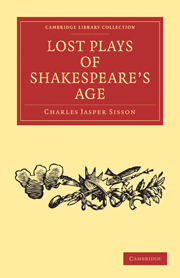Chapter V - THE LIBEL PROPER
Published online by Cambridge University Press: 05 July 2011
Summary
The Libel
It is evident that there was a close connection between specifically dramatic forms of entertainment, with satiric intent at least in part, and satire in other forms. The play of Keep the Widow Waking went along with two ballads celebrating the same events, one of them, a satirical ballad, being actually the reflection of the play and composed by a spectator of the play. The writer of Michael and Frances was probably a well-known local hand at satirical ballad-writing. At Wells the dramatic pageant was set forth in narrative form to preserve its memory, and in the meantime to recall the revels in retrospect to those who had been present or to introduce others to some faint image of their splendour and mirth. And the element of civic and religious strife that entered into those revels also inspired the writing of a formal satire which was closely linked up with the May Game and the ballad, and which in its manner and its quality brings us near to literature of the time which justly has claimed the attention of critics and historians. We may remember how, in the higher reaches of the London literary world, Lodge, Ben Jonson and Marston dipped their pens in critical gall both for formal satire and for satiric drama.
We may well, therefore, be led to consider drama and verse-satire as complementary parts of a considerable mass of literature that gained its savour from personal attacks, more or less disguised.
- Type
- Chapter
- Information
- Lost Plays of Shakespeare's Age , pp. 186 - 203Publisher: Cambridge University PressPrint publication year: 2009First published in: 1936

